Rimbaud
Une Saison En Enfer & Extract from the ‘Voyant’ Letter
Translated by A. S. Kline © Copyright 2002, 2008 All Rights Reserved
This work may be freely reproduced, stored and transmitted, electronically or otherwise, for any non-commercial purpose. Conditions and Exceptions apply.
Contents
- A Season in Hell - Prologue
- Bad Blood
- Night in Hell
- Ravings I – Foolish Virgin, The Infernal Spouse
- Ravings II – Alchemy of the Word
- The Impossible
- Lightning
- Morning
- Farewell
- Extract from the ‘Voyant’ Letter
A Season in Hell - Prologue
(Une Saison en Enfer)
Once, if I remember rightly, my life was a feast where all hearts opened, and all wines flowed.
One evening I sat Beauty on my knees – And I found her bitter – And I reviled her.
I armed myself against Justice.
I fled. O sorceresses, O misery, O hatred, it was to you my treasure was entrusted!
I managed to erase all human hope from my mind. I made the wild beast’s silent leap to strangle every joy.
I summoned executioners to bite their gun-butts as I died. I summoned plagues, to stifle myself with sand and blood. Misfortune was my god. I stretched out in the mud. I dried myself in the breezes of crime. And I played some fine tricks on madness.
And spring brought me the dreadful laugh of the idiot.
Now, just lately, finding myself on the point of uttering the last croak, I thought of seeking the key to the old feast, where I might perhaps find my appetite again!
Charity is the key – This inspiration proves I have been dreaming!
‘You’re a hyena still...’ the demon cries who crowned me with such delightful poppies. ‘Win death with all your appetites; your egoism, all the deadly sins.’
Ah, I’ve practised too many! – But, dear Satan, I beg you, an eye a little less inflamed! And while awaiting my few cowardly little deeds, for you who prize in a writer the lack of descriptive or instructive skill, for you, I tear off these few hideous pages from my notebook of a damned soul.
Bad Blood
(Une Saison en Enfer: Mauvais Sang)
I’ve the whitish blue eye of my Gallic ancestors, the narrow skull, and the awkwardness in combat. I find my clothing as barbarous as theirs. But I don’t butter my hair.
The Gauls were the most inept flayers of cattle and burners of grass of their age.
From them I get: idolatry and love of sacrilege: – oh, all the vices, anger, lust – magnificent, the lust – above all lying and sloth!
I’ve a horror of all trades. Masters and workers: all peasants, ignoble. The hand on the pen’s the same as the hand at the plough. – What an age of hands! – I’ll never get my hand in. Anyway service goes too far. The honesty of beggary upsets me. Criminals disgust me like eunuchs: me, I’m whole, and it’s all one to me!
But! Who made my tongue so deceitful that it’s guided and safeguarded my laziness till now? Without even using my body to live, and idler than a toad, I’ve lived everywhere. Not a family in Europe I don’t know. – I mean families like mine, who owe it all to the declaration of the Rights of Man. – I’ve known every son of good family!
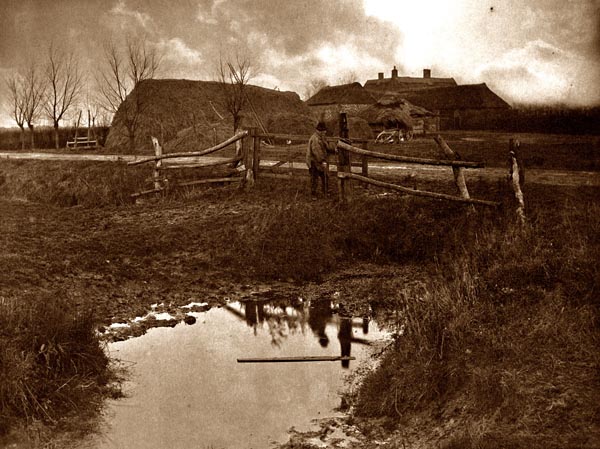
‘A Marsh Farm’
Peter Henry Emerson (British, born Cuba, 1856 - 1936), Getty Open Content Program
✯
If only I’d forerunners at some time or other in the history of France!
But no, nothing.
It’s obvious to me I’ve always belonged to an inferior race. I don’t understand rebellion. My race never rose up except to pillage: like wolves round a beast they haven’t killed.
I recall the history of France, eldest daughter of the Church. As a peasant I’d have made the journey to the Holy Land: I have all the roads of the Swabian plains in my head, all the views of Byzantium, the ramparts of Suleiman: the cult of the Virgin; tenderness for the crucified, wake in me among a thousand profane enchantments. – I sit, a leper, among broken pots and nettles, at the foot of a wall ravaged by the sun. – Later, a mercenary, I’d have bivouacked under German midnights.
Ah! Again: I dance the Sabbath in a red glade, with old women and children.
I remember nothing more distant than this country and Christianity. I’d never be finished with viewing myself in this past. But always alone: without a family: what language, even, did I speak? I never see myself in the counsels of Christ: nor in the councils of the Lords – representatives of Christ.
What was I in the last century? I only discover myself in the present day. No more vagabonds, no more vague wars. The inferior race has spread everywhere – the people, as one says, reason: the nation and science.
Oh! Science! They’ve altered everything. For the body and the soul – the Eucharist – we’ve medicine and philosophy – old wives’ remedies and arrangements of popular songs. And the diversions of princes and the games they prohibited! Geography, cosmography, physics, chemistry! ...
Science! The new nobility! Progress. The world progresses! Why shouldn’t it turn as well?
It’s the vision of numbers. We advance towards the Spirit. It’s quite certain: it’s oracular, what I say. I know, and unaware how to express myself without pagan words, I’d rather be mute.
✯
The pagan blood returns! The Spirit is near, why doesn’t Christ help me by granting my soul nobility and freedom? Alas! The Gospel has passed! The Gospel! The Gospel.
I wait for God with greed. I’ve been of inferior race from all eternity.
Here I am on the Breton shore. How the towns glow in the evening. My day is done: I’m quitting Europe. Sea air will scorch my lungs: lost climates will tan me. To swim, trample the grass, hunt, above all smoke: drink hard liquors like boiling metals – as those dear ancestors did round the fire.
I’ll return with iron limbs; dark skin, a furious look: from my mask I’ll be judged as of mighty race. I’ll have gold: I’ll be idle and brutal. Women care for those fierce invalids returning from hot countries. I’ll be involved in politics. Saved.
Now I’m damned, I have a horror of country. The best is a good drunken sleep on the beach.
✯
One doesn’t go. – Let’s take to the roads again, full of my vice, the vice that has thrust its roots of suffering into my side, since the age of reason – that rises to the sky, strikes me, knocks me down, drags me along.
The last innocence, and the last timidity. I’ve said it. Not to carry my disgust and betrayals through the world.
Let’s go! Marching, burdens, deserts, boredom, anger.
Whom shall I hire myself to? What beast must be adored? What saintly image attacked? What hearts shall I break? What lie must I uphold? – Wade through what blood?
Rather, protect oneself from justice – a hard life, pure brutalisation – to open the coffin lid with a withered hand; sit down, stop your breath. So no old age, no dangers: to be terrified is un-French.
– Ah! I am so forsaken I could offer any divine image no matter what my urges towards perfection.
O my self-denial, O my marvellous pity! Even down
here!
De profundis Domine, what a creature I am!
✯
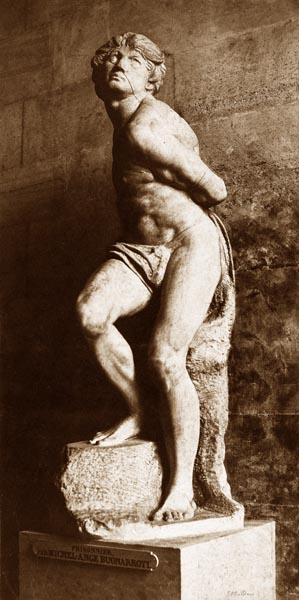
‘The Prisoner, by Michelangelo’
Édouard Baldus (French, born Germany, 1813 - 1889), Getty Open Content Program
Still a child, I admired the stubborn convict on whom the prison gates always close again: I visited inns and lodgings that he might have sanctified with his presence: I saw the blue sky with his mind, and the flowering labour of the countryside: I scented his fate in the towns. He had more strength than a saint, more good sense than a traveller – and he, he alone! As witness to his glory and reason.
On the roads, on winter nights, without shelter, without clothing, without bread, a voice would clutch my frozen heart: ‘Weakness or strength: with you it’s strength. You don’t know where you’re going or why you’re going: go everywhere, react to everything. They won’t kill you any more than if you were a corpse.’ In the morning I had such a lost look, such a dead face, that those who met me perhaps they did not see me.
Suddenly, in the towns, the mud would seem red or black to me, like the mirror when the lamp is carried about in the next room, like a treasure in the forest! Good luck, I’d cry, and I’d see a sea of flames and smoke in the sky: and to right and left all the riches flaming like a trillion lightning flashes.
But orgies and the company of women were forbidden me. Not even a friend. I could see myself before an angry crowd, facing the firing-squad, weeping with a misery they couldn’t have understood, and forgiving them! – Like Joan of Arc! – ‘Priests, professors, masters, you’re wrong to hand me over to justice. I’ve never been part of this race. I’ve never been a Christian: I’m of the race that sings under torture: I don’t understand the law: I’ve no moral sense, I’m a brute: you’re wrong...’
Yes, I’ve shut my eyes to your light. I’m a beast, a black. But I can be saved. You are really blacks, you maniacs; wild beasts, misers. Merchant, you’re a black: magistrate, you’re a black: general, you’re a black: emperor, you old sore, you’re a black: you’ve drunk an untaxed liquor, Satan’s make. – This race is inspired by fever and cancer. Old folks and invalids are so respectable they ask to be boiled. – The cleverest thing is to quit this continent, where madness prowls to find hostages for these wretches. I’m off to the true kingdom of the sons of Ham.
Do I know nature yet? Do I know myself? – No more words. I bury the dead in my gut. Shouts, drums, dance, dance, dance, dance! I don’t even see the moment when the whites land and I’ll fall to nothingness.
Hunger, thirst, shouts, dance, dance, dance, dance!
✯
The whites are landing. Cannon! We have to submit to baptism, clothes, work.
I’ve received the coup de grâce to my heart. Ah! I hadn’t foreseen it!
I’ve done nothing wrong. The days will pass easily for me, repentance will be spared me. I’ll not have known the torments of the soul that’s almost dead to virtue, where the light rises severely like that from funeral tapers. The fate of a son of good family, an early coffin scattered with crystal tears. Doubtless, debauchery is foolish; vice is foolish, rottenness must be thrown out. But the clock has not yet taken to striking only hours of pure sadness! Shall I be carried off like a child to play in paradise forgetting all unhappiness?
Quick! Are there other lives? – Repose with riches is impossible. Wealth has always been so public. Divine love alone offers the keys of knowledge. I see that nature is nothing but a show of kindness. Farewell chimeras, ideals, errors.
The rational song of the Angels rises from the lifeboat: it is divine love. – Two Loves! I can die of earthly love, or die of devotion. I’ve left souls for whom the pain of my departure increases! You have chosen me from the shipwrecked: those who are left aren’t they my friends?
Save them!
Reason is born in me. The world is good. I’ll bless life. I’ll love my brothers. These are no longer childish promises. Nor the hope of escaping old age and death. God give me strength and I praise God.
✯
Tedium’s no longer my love. Rage, debaucheries, madness, all of whose joys and disasters I know – my whole burden’s laid down. Let us appreciate without dizziness the extent of my innocence.
I’d no longer be capable of demanding the comfort of a bastinado. I don’t think I’m embarking for a wedding with Jesus Christ for father-in-law.
I’m not a prisoner of my reason. I said: ‘God, I want freedom in salvation: how to pursue it? Frivolous tastes have quit me. No need for self-sacrifice or divine love any more. I don’t regret the age of sensitive hearts. Each has his reason, scorn, pity: I retain my place at the summit of this angelic ladder of good sense.
As for established happiness: domestic or not...no, I can’t. I’m too dissipated, too feeble. Life flowers through work, an old truth: me, my life is too insubstantial, it flies off and drifts around far above the action that focus dear to the world.
What an old maid I’m becoming, lacking the courage to love death!
If God would grant me celestial, aerial, calm, prayer – like the ancient saints – the Saints! Strong ones! The anchorites, artists for whom there’s no longer need!
Continual farce! My innocence should make me weep. Life is the farce all perform.
✯
Enough! Here is the sentence. - March!
Ah! My lungs burn, my brow throbs! Night revolves in my eyes, in this sun! Heart...limbs...
Where to? To fight? I’m weak! The others advance. Equipment, arms...the weather! ...
Fire! Fire at me! Here! Or I’ll surrender – Cowards! – I’ll kill myself! I’ll hurl myself under the horses’ hooves!
Ah! ...
– I’ll get used to it.
That would be the French way, the path of honour!
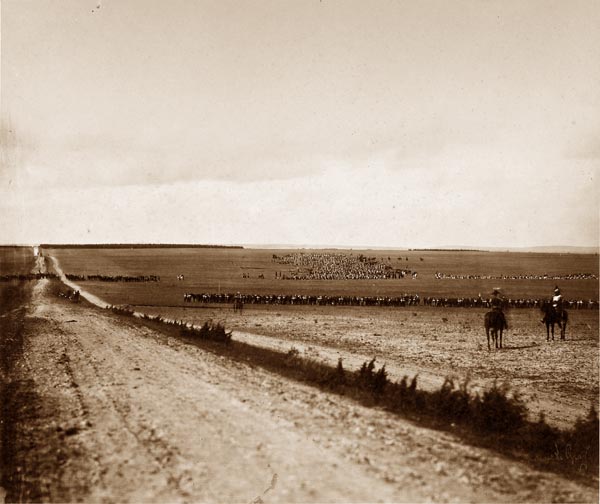
‘Maneuvers, Camp de Chalons’
Gustave Le Gray (French, 1820 - 1884), Getty Open Content Program
Night in Hell
(Une Saison en Enfer: Nuit de L’Enfer)
I have swallowed a famous gulp of poison – Thrice blessed be the thought that came to me! – My guts are burning. The venom’s violence wracks my limbs; deforms me, fells me. I’m dying of thirst; I’m stifling, unable to cry out. It’s hell, the everlasting torment! See how the flames rise up! I’m burning in the proper manner. Well then, demon!
I’ve glimpsed a conversion to goodness and joy, salvation. Let me describe the vision, the air of hell suffers no hymns! It was of millions of enchanting creatures, sweet spiritual harmony, strength and peace, noble ambitions, who knows what?
Noble ambitions!
There’s life yet! – What if damnation is eternal! A man who wants to mutilate himself is truly damned, is he not? I think myself in hell, therefore I am. It’s the ratification of the catechism. I’m the slave of my baptism. Parents, you caused my wretchedness and your own. Poor innocent! – Hell can’t touch pagans – There’s life yet! Later the delights of damnation will deepen. A crime, quick, let me fall into the void, in the name of human law.
Quiet, quiet there! ... Here’s shame and reproach: Satan, who says that the fire is ignoble, that my anger is fearfully stupid. – Enough! ... Of the errors whispered to me, magic, false perfumes, puerile music. – And to think that I grasp truth, see justice: my judgement is sane and sound, I am ready for perfection... Pride – the skin of my head dries up. Pity! Lord, I’m afraid. I thirst, such thirst! Ah, childhood, grass, the rain, the lake over stones, the moonlight when the clock struck twelve! ...the devil’s in the belfry, at that hour. Mary! Holy Virgin! – Horror at my stupidity.
Back there, aren’t there honest souls, who wish me well? ... Come...I’ve a pillow over my mouth; they can’t hear me, they’re phantoms. Besides, no one ever thinks of others. Let no one come near me. I smell of scorching, that’s certain.
The hallucinations are innumerable. That’s what has always been wrong with me, in fact: no belief in history, obliviousness to principles. I’ll be quiet about it: poets and visionaries would be jealous. I am a thousand times richer, let’s be as miserly as the sea.
See there! The clock of life has just stopped. I am no longer in the world – Theology is no joke, hell is certainly down below – and heaven above – Ecstasy, nightmare, slumber in a nest of flames.
What tricks while waiting in the countryside...Satan, Ferdinand, runs rife with wild seed...Jesus walks on the purple briars, without bending them...Jesus once walked on the troubled waters. The lantern showed him to us standing, pale with brown tresses, on the flank of an emerald wave...
I shall unveil all the mysteries: mysteries religious or natural, death, birth, future, past, cosmogony, nothingness. I am a master of phantasmagoria.
Listen! ...
I possess every talent! – There is no one here, yet there is someone: I don’t wish to spill my treasure – Shall it be negro chants, the dance of houris? Shall I vanish, dive deep in search of the ring? Shall I? I will make gold, cures.
Have faith then in me, faith soothes, guides, heals. Come, all you – even the little children – let me console you, may a heart go out to you – the marvellous heart! – Poor men, workers! I don’t ask for prayer; with your trust alone, I’ll be happy.
– And let us consider myself. It makes me regret the world very little. I was lucky not to suffer more. My life was nothing but sweet follies, it’s regrettable.
Bah! Let us make every possible grimace.
Decidedly, we are beyond the world. No more sounds. My sense of touch: gone. Ah, my chateau, my Saxony, my rank of willows! Evenings, dawns, nights, days...How weary I am!
I ought to have a hell for my anger, a hell for my pride, – and a hell for my caresses; a concert of hells.
I’m dying of lassitude. It’s the tomb; I’m going to the worms, horror of horrors! Satan, you trickster, you want to destroy me with your enchantments. I demand, I demand one prick of the fork, one drop of the fire!
Ah, to rise again to life! To set eyes on our deformities. And that poison, that kiss a thousand times damned! My weakness, the world’s cruelty! My God, have pity, hide me, I can’t defend myself! – I’m hidden yet un-hidden.
It’s the fire that flares again with its damned soul.
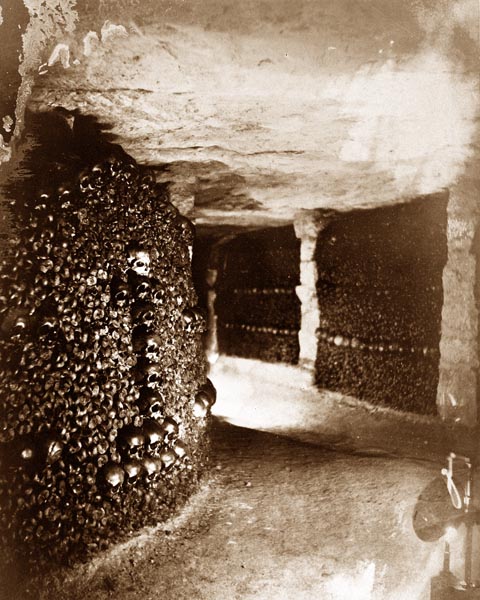
‘View in the Catacombs’
Nadar [Gaspard Félix Tournachon] (French, 1820 - 1910), Getty Open Content Program
Ravings I – Foolish Virgin, The Infernal Spouse
(Une Saison en Enfer: Délires I: Vierge Folle, L’Époux Infernal)
Let us hear the confession of a companion in hell:
‘O divine Spouse, my Lord, do not refuse the confession of the most sorrowful of your servants. I am lost. I am drunk. I am impure. What a life!
Forgiveness, divine Lord, forgiveness! Ah, forgiveness! What tears! And what tears again, later, I hope!
Later, I will know the divine Spouse! I was born His slave. – The other can beat me for now!
At present, I inhabit the world’s depths! O my friends! ... No, not my friends...Never such ravings such torments...It’s so stupid!
Ah, I suffer, cry out! I suffer truly. And yet all is permitted me, weighed down with the contempt of the most contemptible hearts.
Well then, let us confide this thing, though we repeat it twenty times more – just as drearily, as insignificant!
I am slave to the infernal Spouse, he who ruined the foolish virgins. It’s indeed that very same demon. It’s no spectre, it’s no phantom. But I who have lost my wisdom, who am damned and dead to the world – they won’t kill me! – How can I describe him to you! I can’t speak any more. I am in mourning, I weep, I fear. A little coolness, Lord, if you please, if you graciously please!
I’m a widow...– I was a widow... – why yes, I was very respectable once, I was not born to be a skeleton! ... – He was almost a child...His mysterious sensitivities seduced me. I forgot all my human tasks to follow him. What a life! The true life is absent. We are not in this world. I go where he goes, I have to. And often he’s angry with me, me, poor soul. The Demon! – He’s a Demon you know, he’s not a man.
He says: “I don’t like women. Love must be re-invented, that’s certain. All they do is long for security. Once gained, heart and beauty are set aside: only cold disdain remains, the fodder of marriage, nowadays. Or else I see women, with the marks of happiness, whom I could have made into fine comrades, devoured from the start by brutes as sensitive as posts...”
I listen to him make infamy of glory, charm of cruelty. “I’m of a distant race: my forefathers were Scandinavian: they slashed their sides, drank their own blood. – I’ll make cuts all over; I’ll tattoo myself, I long to be hideous as a Mongol: you’ll see, I’ll scream in the streets. I want to be mad with rage. Never show me gems, I’d crawl on the carpet and writhe. My treasure, I’d like to be stained all over with blood. I’ll never work...” On several nights, his demon seized me; we rolled about, I wrestled him! – At night, often, drunk, he lies in wait in the streets or houses, to frighten me to death. – “They’ll cut my throat, truly; it will be ‘disgusting’.” Oh, those days when he chooses to stroll about like a criminal!
Sometimes he speaks in a kind of tender patois, of death which brings repentance, of the wretches who must exist, of painful toil, and partings that rend hearts. In the hovels where we used to get drunk together, he would weep to see those around us, wretched cattle. He would help to their feet the drunks in dark alleys. He’d a wicked mother’s pity for little children. – He’d go about with the air of a little girl on the way to her catechism. – He feigned all knowledge, of commerce, art, medicine. – I followed him, I have to!
I could see the whole scene with which, in his mind, he surrounded himself: clothes, fabrics, furniture; I lent him emblems, another face. I saw all that touched him, as he would have created it for himself. When he seemed listless, I followed him, myself, in strange and complex deeds, far out, for good or ill: I was certain of never entering his world. How many hours of vigil, beside his dear sleeping body, questioning why he wanted to evade reality so deeply! No man every wished for it so. I realised – without fearing for him – that he might well prove a serious danger to society. – He knows perhaps secrets for transforming life? No, he only seeks them, I’d tell myself. Then, his charity is bewitched, and I’m its prisoner. No other soul would have had the strength – the strength of despair – to endure it – to be protected and loved by him! Besides, I could never imagine him with some other soul: one sees one’s own Angel, never another’s – I think. In his soul it was as if I were in a palace, emptied so none as base as self can be seen: that’s it. Alas! I depended on him deeply. But what did he want with my dull cowardly existence? He made me no better, even though he failed to kill me! Sadly distressed, I sometimes said to him: “I understand you.” He shrugged his shoulders.
So, my grief endlessly renewed, finding myself even more bewildered in my own eyes – as in all those eyes that would have wished to stare at me, had I not been condemned to be forgotten forever by all! – I became ever hungrier for his kindness. With his kisses and loving embraces, it was truly heaven, a sombre heaven, which I entered, and where I would gladly have been left, poor; deaf, dumb, blind. I was already used to it. I saw us as two good children, free to wander in the Paradise of sorrow. We were well suited. Deeply stirred, we toiled together. But, after a penetrating caress he would say: “How odd it will seem to you, when I’m no more, all you have been through. When you no longer have my arms beneath your neck; nor my heart to rest on, nor this mouth on your eyes. Because I must go far away, one day. And then, I must help others: it’s my duty. Though that’s scarcely appealing...dear soul...” Suddenly I saw myself, with him vanished, in the grip of vertigo, hurled into the most frightful darkness: death. I made him promise never to leave me. He gave it twenty times, that lover’s promise. It was as frivolous as my telling him: “I understand.”
Ah, I have never been jealous of him! He will never leave me, I think. To do what? He knows no one; he will never work. He wants to live like a sleepwalker. Would his goodness and kindness alone grant him rights in the world of reality? At times, I forget the pitiful state into which I’ve fallen: he will make me strong, we shall travel, we’ll hunt in the deserts, sleep on the pavements of unknown towns, without cares or troubles. Or I will wake, and laws and customs will have changed – thanks to his magical powers – the world, remaining the same, will leave me to my desires; joys, nonchalance. Oh, will you grant me the life of adventures that exists in children’s books, to repay me, I’ve suffered so? He cannot. I don’t know what’s ideal for him. He told me he had regrets, hopes: they can’t involve me. Does he talk to God? Perhaps I should address myself to God. I am in the deepest abyss, and no longer know how to pray.
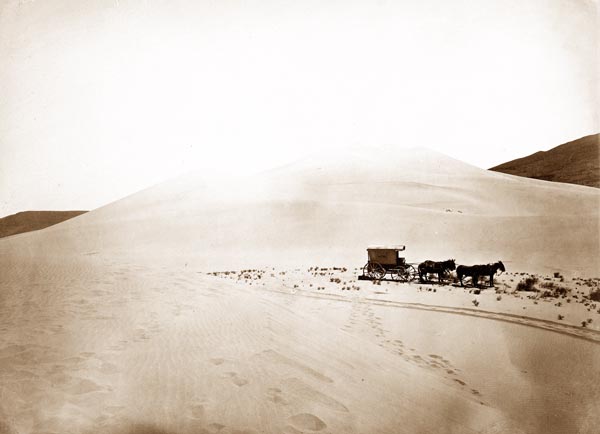
‘Desert Sand Hills near Sink of Carson, Nevada’
Timothy H. O'Sullivan (American, about 1840 - 1882), Getty Open Content Program
If he explained his sadness to me, would I understand it any better than his raillery? He attacks me, spends hours making me ashamed of all in this world that has the power to touch me, indignant if I weep.
“– You see that elegant youth, entering that fine and peaceful house: he’s called Duval, Dufour, Armand, Maurice, who knows? A woman devoted herself to loving this spiteful fool: she died; she’s certainly a saint in heaven, now. You’ll kill me as he killed her. That’s our fate, we charitable hearts...” Alas, he had days when all human activity seemed to him a plaything of grotesque delirium; he would laugh horribly for hours! – Then, he would resume his pose of a young mother, a beloved sister. If he were only less savage, we would be saved! But his sweetness too is deadly. I submit to him. – Ah, I am mad!
One day perhaps he’ll miraculously vanish; but I must know if he’s to attain some heaven, so I may glimpse my little friend’s assumption!’
A strange ménage!
Ravings II – Alchemy of the Word
(Une Saison en Enfer: Délires II: Alchimie du Verbe)
My turn. The history of one of my follies.
For ages I boasted of possessing all possible landscapes, and found the celebrities of modern painting and poetry absurd.
I loved idiotic pictures, fanlights, stage scenes, mountebanks’ backcloths, inn-signs, popular prints; unfashionable literature, church Latin, erotic books with poor spelling, novels of grandmother’s day, fairy tales, little books for children, old operas, empty refrains, naïve rhythms.
I dreamt of crusades, unrecorded voyages of discovery, republics without histories, wars of suppressed religion, moral revolutions, movements of races and continents: I believed in every enchantment.
I invented the colour of vowels! A black, E white, I red, O blue, U green. – I regulated the form and motion of every consonant, and, with instinctive rhythms, I flattered myself I’d created a poetic language, accessible some day to all the senses. I reserved the translation rights.
It was academic at first. I wrote of silences, nights, I expressed the inexpressible. I defined vertigos.
✯
Far from the village girls, birds and cattle,
On my knees, what was I drinking, all
Surrounded by tender hazel copses,
In an afternoon mist, green and warm?
From that young Oise, what could I be drinking,
– Mute elms, flowerless turf, dull sky –
From yellow gourds, far from my dear hut slinking?
A gold liquor that yields sweat by and by.
I made a dubious inn-sign – Weather
Came coursing the heavens. At evening
Lost in a virgin sand the wood’s water,
The wind, of God, the ponds re-icing:
– I could not drink: I saw gold, weeping!
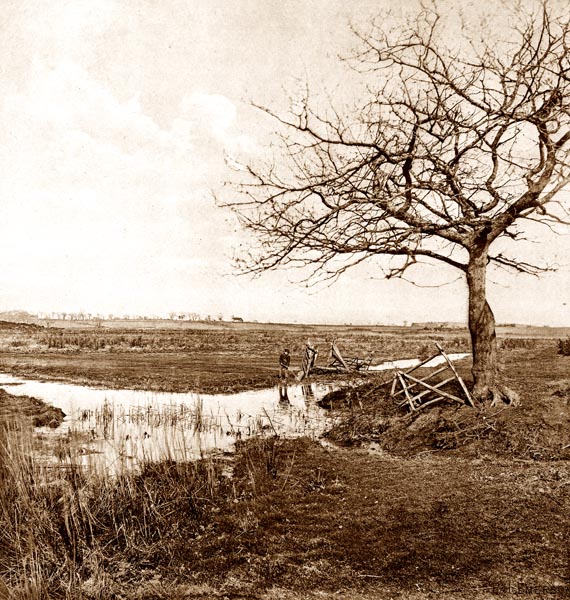
‘Leafless March’
Peter Henry Emerson (British, born Cuba, 1856 - 1936), Getty Open Content Program
✯
At four on a summer morning,
The slumber of love still lasts.
Under the hedge fade fast
Scents of the night’s feasting.
Down there and already astir
In the Hesperidean sun,
In their vast workshop, as one,
In shirtsleeves – the Carpenters.
In their deserts of foam, tranquilly,
They prepare costly panelling
On which the city
Will daub its deceitful painting.
O, for those workmen, charming
Subjects of a king of Babylon,
Venus! Leave the lovers sleeping,
Whose souls a crown have on.
O Queen of the Shepherds
Take strong drink to the workers too,
So their efforts may be deferred
As they wait to bathe in the sea at noon.
✯
Poetical archaisms played a key role in my alchemy of the word.
I accustomed myself to pure hallucination: I saw quite clearly a mosque instead of a factory, a college of drummers consisting of angels, a salon in the depths of a lake; monsters, mysteries; a vaudeville title conjured up terrors before me.
Then I explained my magical sophisms with hallucinatory words!
I ended by treating my mental disorder as sacred. I was idle, prey to a heavy fever: I envied the happiness of beasts – caterpillars: that represent Limbo’s innocence, moles: the sleep of virginity!
My character was embittered. I took my leave of the world in various ballads:
SONG OF THE HIGHEST TOWER
Let it come, let it come
The day when hearts love as one.
I’ve been patient so long
I’ve forgotten even
The terror and suffering
Flown up to heaven,
A sick thirst again
Darkens my veins.
Let it come, let it come
The day when hearts love as one.
So the meadow
Freed by neglect,
Flowered, overgrown
With weeds and incense,
To the buzz nearby
Of foul flies.
Let it come, let it come
The day when hearts love as one.
I loved the wilds, scorched orchards; faded shops, lukewarm drinks. I would drag myself through stinking alleys, and, eyes closed, offer myself to the sun, god of fire.
“General, if there’s one old cannon left on your ruined ramparts, bombard us with chunks of dried earth. Fire on the windows of splendid stores! Into the salons! Make the city eats its own dust. Oxidise the gargoyles. Fill the boudoirs with burning powdered rubies...”
Oh, the drunken gnat in the pub urinal, in love with borage, that a ray of light dissolves!
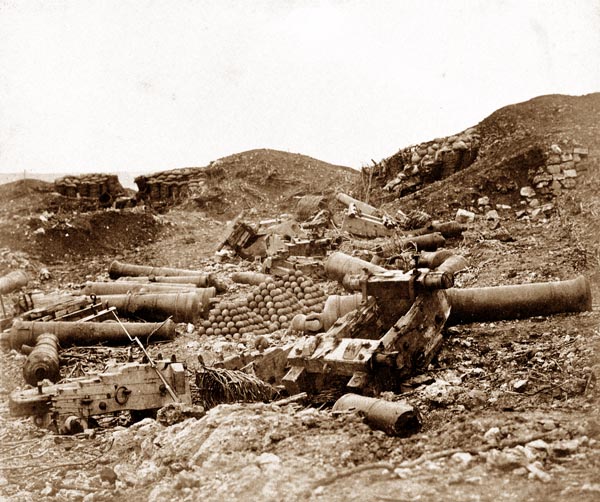
‘Broken Cannons in Korniloff Redoubt’
Léon-Eugène Méhédin (French, 1828 - 1905), Getty Open Content Program
HUNGER
If I’ve any taste, it’s for barely
Anything but stone and slurry.
I breakfast ever on air,
Coal, iron and the rockery.
My hungers, turn. Hungers, browse
The field of sound.
Suck the gaudy venom
From the weedy ground.
Eat what’s broken, pebbly,
That old religious debris;
Rocks from a past deluge,
Loaves sown in grey valleys.
✯
The fox howled in the leaves
Spitting out bright plumes
From his poultry feast:
Like him I self-consume.
The fruits and the veg
Wait only for the pickers;
But the spider in the hedge
Eats violets, no others.
Let me sleep! Let me simmer
On the fires of Solomon.
Down the rust, boiling over,
Mingling there with the Kedron.
At last, O happiness, O reason, I plucked from the sky the azure, which is of blackness, and I lived, a golden spark of natural light. From joy, I adopted the most clownish exaggerated expression possible:
It’s found we see!
What? – Eternity.
It’s the sun, mingled
With the sea.
My immortal soul
Keep your vow
Despite empty night
And the day’s glow.
Thus you’ll diverge
From the mortal weal
From the common urge,
To fly as you feel...
– No hope, never,
No entreaty here.
Science and patience,
Torture is real.
No more tomorrow,
Embers of satin,
Your own ardour
The only duty.
It’s found we see.
– What? – Eternity.
It’s the sun, mingled
With the sea.
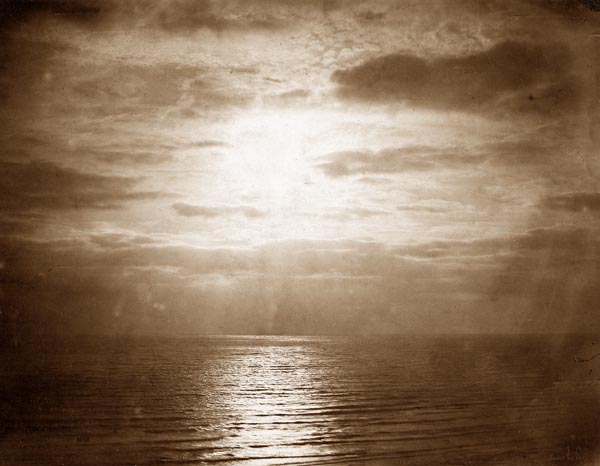
‘Mediterranean Seascape with Cloud Study’
Gustave Le Gray (French, 1820 - 1884), Getty Open Content Program
✯
I became a fabulous opera: I saw that all beings are fated for happiness: activity is not life, but a way of wasting strength, an enervation. Morality is a weakness of the brain.
To every being, I felt, several other lives seemed due. This gentlemen knows not what he does, he’s an angel. This family is a pack of dogs. Before several men I have spoken aloud in a moment of their other lives. – Thus, have I loved a pig.
None of the sophistries of madness – that madness they lock away – were forgotten by me: I could recite them all, I know the system.
My health was threatened. Terror arrived. I fell into a slumber for several days, and, waking, continued in saddest dream. I was ripe for death, and by a perilous road my weakness led me to the confines of the world and Cimmeria, land of shadows and whirlwinds.
I was forced to travel, to distract myself from the enchantments thronging my brain. Over the sea, which I loved as if it were sure to cleanse me of defilement, I saw the consoling cross arise. I had been damned by the rainbow. Happiness was my fatality, my remorse, my worm: my life would forever be too immense to be devoted to strength and beauty.
Happiness! Its tooth, sweet unto death, warned me at cockcrow – ad matutinam, at Christus venit, – in the darkest cities:
O seasons, O chateaux!
Where is the flawless soul?
The magic study I pursued,
Of happiness, none can elude.
A health to it, each time
The Gallic cock makes rhyme.
Ah! There’s nothing I desire,
It’s possessed my life entire.
That charm has taken heart and soul
Scattered all my efforts so.
O seasons, O chateaux!
The hour of its flight, alas!
Will be the hour I pass.
O seasons, O chateaux!
✯
That’s all past. I know these days how to greet beauty.
The Impossible
(Une Saison en Enfer: L’Impossible)
Ah, that life of my childhood, the highway in all weathers, supernaturally sober, more disinterested than the finest of beggars, proud of having neither country nor friends, how foolish it was. – And only now do I realise!
– I was right to despise those fellows who never lose the chance for a caress, parasites on the cleanliness and health of our women, now they are in such slight accord with us.
I was wholly right in my disdain: since I am fleeing!
I’m fleeing!
I’ll explain.
Yesterday, I was still sighing: ‘Heaven! There are enough of us damned down here! I’ve already spent too long, myself, amongst this crew! I know them all. We’ll always recognise each other; we find each other disgusting. Charity’s unknown to us. But we’re polite; our relations with people are perfectly correct.’ Is it surprising! People! Merchants, fools! – We’re not dishonoured – But the elect, how would they receive us? For there are pugnacious and joyous folk: a false elect since we need neither audacity nor humility to approach them. They are the sole elect. They never bless others!
Having found two sous of sense again – it’s quickly spent! – I see my ills come of not realising soon enough that we are in the West. The western swamps! Not that I believe the light altered, the form extenuated, the movement astray...Well, then! Here my mind wants to burden itself absolutely with all the cruel developments the mind has suffered since the end of the East...it bears a grudge my mind!
...My two sous of sense are spent! – Mind has authority: it wants me to be in the West. It would have to be silenced for me to end as I wish.
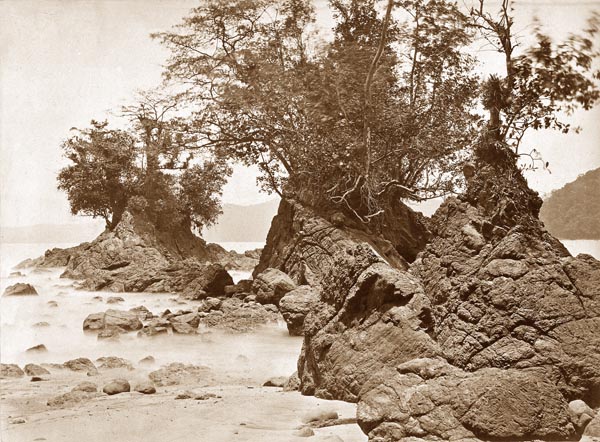
‘Tropical Scenery, Islands, Limon Bay’
John Moran (American, born England, 1829 - 1902), Getty Open Content Program
I consigned to the devil the martyrs’ palm-leaves, the light of art, the pride of inventors, the ardour of looters; I returned to the East and primal eternal wisdom – It seems that’s a dream of gross idleness!
Yet I hardly dreamt of the pleasure of escaping from modern suffering. I’d not the bastard wisdom of the Koran in mind – But is there not true torture in the fact that, ever since that declaration of knowledge Christianity, man has cheated himself, proved the obvious, swollen with pleasure at repeating the proof, and lived only like that! Subtle torture, foolish; the source of my spiritual divagations. Nature could be bored, perhaps! Monsieur Prudhomme was born with Christ.
Is it not because we nurture mists! We eat fever with our watery greens. And the drunkenness! And tobacco! And ignorance! And devotions! – Isn’t all that far from the thought, the wisdom of the East, the primeval land? Why a modern world, if they invent such poisons!
Men of the Church say: ‘Understood. But you really mean Eden. Not for you, the history of eastern peoples. – It’s true: it was Eden I dreamt of! What has that purity of ancient races to do with my dream!
The philosophers: The world has no age. Humanity simply moves about. You are in the West, but free to inhabit your East, as old as you wish it – and live there well. Don’t be one of the defeated. Philosophers, you belong to your West.
My mind, be on your guard. No violent decisions on salvation. Stir yourself! – Ah, science is not swift enough for us!
– But I see my mind is asleep.
If it were always awake from now on, we would soon arrive at truth, which perhaps surrounds us with its angels weeping! ... – If it had been awake till now, I would never have yielded to pernicious instincts, in an immemorial age! ... If it had always been awake, I should be voyaging full of wisdom! ...
O Purity! Purity!
It’s this very moment that has granted me a vision of purity! – By mind one goes to God!
Heart-rending misfortune!
Lightning
(Une Saison en Enfer: L’Éclair)
Human labour! It’s the explosion that lightens my abyss from time to time.
‘Nothing’s in vain: on to Science, forward!’ Cries the modern Ecclesiastes, that’s to say The Whole World. And yet the corpses of the wicked and idle still fall on the hearts of others...Ah! Quick, quick, a moment: there, beyond the night, that future recompense, eternal...shall we escape them? ...
– What can I do? I know work: and Science is too slow. How prayer gallops and light groans... I see that clearly. It’s too simple, and the weather’s too warm: they’ll do without me. I’ve my duty: I’ll be proud the way others are, in setting it aside.
My life’s used up. Let’s go! Cheat, do nothing, O the pity! And we’ll exist by amusing ourselves, dreaming monstrous loves and fantastic universes, moaning and quarrelling with the world’s shows, acrobat, beggar, artist, ruffian – priest! In my hospital bed, the smell of incense returned to me so strongly: guardian of the holy herbs, confessor, martyr...
I recognise now my rotten childhood education. So what! ...Let me be twenty, if the others are going to be twenty...
No! No! Now I rebel against death! Work seems too trivial for my pride: my betrayal to the world would be too brief a torment. At the last I’ll attack to right and left...
Then – oh – poor dear soul, eternity would not be lost to us!
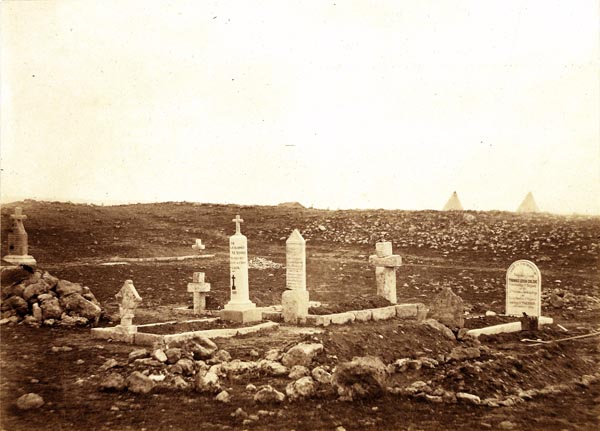
‘Cemetary, Cathcarts Hill’
Roger Fenton (English, 1819 - 1869), Getty Open Content Program
Morning
(Une Saison en Enfer: Matin)
Once upon a time did I not have a pleasant childhood, heroic, fabulous, to be written on leaves of gold – too fortunate! For what crime, what error, have I merited present weakness? You who claim that the creatures sob with grief, that the sick despair, that the dead have bad dreams, try to recount my fall and my slumber. I can explain myself no better than the beggar with his incessant Our Father’s and Hail Mary’s. I can speak no more.
Yet today I think I’ve finished my tale of hell. It was hell, for certain; the ancient one, whose gates the son of man opened wide.
From the same desert, in the same night, always my weary eyes wake to the star of silver, always, without troubling the Kings of life, the three mages, heart, soul, and mind. When shall we go beyond the shores and mountains, to hail the birth of fresh toil; fresh wisdom, the rout of tyrants and demons, the end of superstition, to adore – as newcomers – Christmas on earth!
The song of the heavens, the march of peoples! Slaves, let us not curse life.
Farewell
(Une Saison en Enfer: Adieu)
Autumn already! – But why regret an eternal sun, if we are engaged in discovering the divine light – far from races that die with the seasons.
Autumn. Our ship towering in the motionless fog turns towards the port of poverty, the enormous city with a sky that’s flecked with fire and mud. Ah! The rotting rags; the bread soaked with rain, the drunkenness, the thousand loves that have crucified me! She’ll never have done then, this ghoulish queen of millions of souls and corpses who will be judged! I see my skin ravaged again by mud and pestilence, worms filling my hair and my armpits, and bigger worms in my heart, stretched out among ageless unknowns, without feeling...I might have died there...Horrible imagining! I detest poverty.
And I fear winter because it’s the season of comfort!
– Sometimes I see limitless beaches in the sky covered by white nations full of joy. A great golden vessel, above me, waves its multicoloured flags in the morning breeze. I’ve created all the feasts, all the triumphs, all the dramas. I’ve tried to invent new flowers; new stars, new flesh, new languages. I believed I’d gained supernatural powers. Ah well! I must bury my imagination and my memories! Sweet glory as an artist and story-teller swept away!
– I! I, who called myself magus or angel, exempt from all morality, I’m returned to the soil, with a task to pursue, and wrinkled reality to embrace! A peasant!
Am I wrong? Is pity the sister of death, for me?
Well, I shall ask forgiveness for nourishing myself with lies. Let’s go.
But no friendly hand! And where to find help?
✯
Yes, the present hour is very severe at least.
Since I can say the victory is won: the gnashing of teeth, the hissing of flames, the pestilential sighs are fading. All the foul memories are vanishing. My last regrets flee. – My envy of beggars, brigands, friends of Death, all sorts of backward ones. – Damned ones, if I revenged myself!
It’s necessary to be absolutely modern.
No hymns: hold the yard gained. Harsh night! The dried blood smokes on my face, and I’ve nothing at my back but that horrible stunted tree! ...Spiritual combat is as brutal as the warfare of men: but the vision of justice is God’s delight alone.
Still, now is the eve. Let us receive every influx of strength and true tenderness. And at dawn, armed with an ardent patience, we’ll enter into the splendid cities.
What did I say about a friendly hand? One real advantage, is that I can smile at old false loves, and blast those lying couples with shame – I’ve seen the hell of women down there: – and it will be granted me to possess truth in a soul and a body.
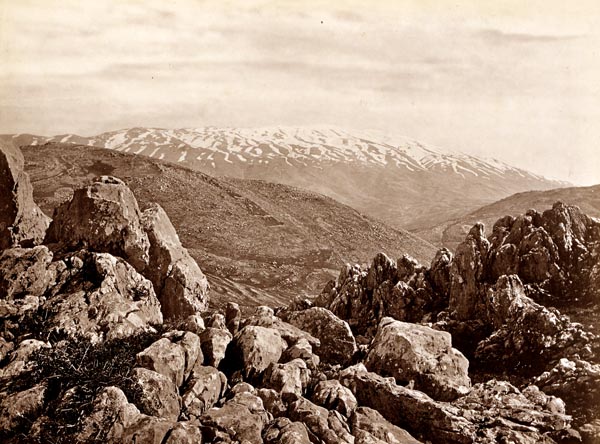
‘Mount Hermon, the Mount of Transfiguration’
Francis Frith (English, 1822 - 1898), Getty Open Content Program
April-August, 1873
Extract from the ‘Voyant’ Letter
(Lettre à Paul Demeny: Charleville, 15 mai 1871)
‘Romanticism has never been properly judged. Who could judge it? The Critics! The Romantics! Who prove so clearly that the singer is so seldom the work, that’s to say the idea sung and intended by the singer.
For I is another. If the brass wakes the trumpet, it’s not its fault. That’s obvious to me: I witness the unfolding of my own thought: I watch it, I hear it: I make a stroke with the bow: the symphony begins in the depths, or springs with a bound onto the stage.
If the old imbeciles hadn’t discovered only the false significance of Self, we wouldn’t have to now sweep away those millions of skeletons which have been piling up the products of their one-eyed intellect since time immemorial, and claiming themselves to be their authors!
In Greece, as I say, verse and lyre took rhythm from Action. Afterwards, music and rhyme are a game, a pastime. The study of the past charms the curious: many of them delight in reviving these antiquities: – that’s up to them. The universal intelligence has always thrown out its ideas naturally: men gathered a part of these fruits of the mind: they acted them out, they wrote books by means of them: so it progressed, men not working on themselves, either not being awake, or not yet in the fullness of the great dream. Civil-servants – writers: author; creator, poet: that man has never existed!
The first study for the man that wants to be a poet is true complete knowledge of himself: he looks for his soul; examines it, tests it, learns it. As soon as he knows it, he must develop it! That seems simple: a natural development takes place in every brain: so many egoists proclaim themselves authors: there are plenty of others who attribute their intellectual progress to themselves! – But the soul must be made monstrous: after the fashion of the comprachicos, yes! Imagine a man planting and cultivating warts on his face.
I say one must be a seer (voyant), make oneself a seer.
The Poet makes himself a seer by a long, rational and immense disordering of all the senses. All forms of love, suffering, madness: he searches himself; he consumes all the poisons in himself, to keep only their quintessence. Unspeakable torture, where he needs all his faith, every superhuman strength, during which he becomes the great patient, the great criminal, the great accursed – and the supreme Knower, among men! – Because he arrives at the unknown! Because he has cultivated his soul, already rich, more than others! He arrives at the unknown, and when, maddened, he ends up by losing the knowledge of his visions: he has still seen them! Let him die charging among those unutterable, unnameable things: other fearful workers will come: they’ll start from the horizons where the first have fallen! ...............
I’ll go on:
So the poet is truly the thief of fire, then.
He is responsible for humanity, even for the animals: he must make his inventions smelt, felt, heard: if what he brings back from down there has form, he grants form: if it’s formless he grants formlessness. To find a language – for that matter, all words being ideas, the age of a universal language will come! It is necessary to be an academic – deader than a fossil – to perfect a dictionary of any language at all. The weak-minded thinking about the first letter of the alphabet would soon rush into madness!
This language will be of the soul for the soul, containing everything, scents, sounds, colours, thought attaching to thought and pulling. The poet would define the quantity of the unknown, awakening in the universal soul in his time: he would give more than the formulation of his thought, the measurement of his march towards progress! An enormity become the norm, absorbed by all, he would truly be an enhancer of progress!
This future will be materialistic, you see. – Always filled with Number and Harmony, these poems will be made to last. – At heart, it will be a little like Greek poetry again.
Eternal art will have its function, since poets are citizens. Poetry will no longer take its rhythm from action: it will be ahead of it!
These poets will exist! When woman’s endless servitude is broken, when she lives for and through herself, when man – previously abominable – has granted her freedom, she too will be a poet! Women will discover the unknown! Will her world of ideas differ from ours? – She will discover strange things, unfathomable; repulsive, delicious: we will take them to us, we will understand them.
Meanwhile, let us demand new things from the poets - ideas and forms. All the clever ones will think they can easily satisfy this demand: that’s not so! .....